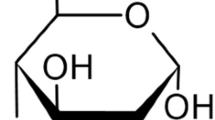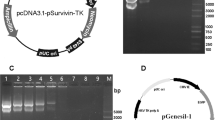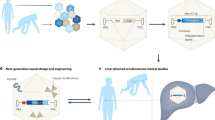Abstract
Gene therapy for cancer requires efficient, selective gene transfer to cancer cells. In gene therapy for hepatocellular carcinoma (HCC), gene transfer is efficient for small tumors, but not for large tumors. The delivery of anticancer agents and of iodized oil esters as embolic agents through tumor-feeding arteries is known as transarterial embolization. We speculate that genes may be efficiently and selectively transferred for HCC using iodized oil esters because these esters may remain together with a genetic vector within HCC selectively. Hence, we have studied the effect of iodized oil esters on adenovirus vector–mediated gene transfer for HCC in vivo. A rat model of HCC induced with diethylnitrosamine and phenobarbital was injected with either AxCALacZ, which expresses the β-galactosidase of Escherichia coli , or AxCALacZ and iodized oil esters into the hepatic artery. Histological comparisons revealed that the β-galactosidase expression in the rats with HCC injected with AxCALacZ and iodized oil esters was greater ( P <.0001) in small tumors ( P =.0046) and large tumors ( P =.0023), and more selective ( P =.0229) than in only AxCALacZ-injected rats. These results suggest that iodized oil esters are injected into hepatic artery together with adenovirus vector, and that genes may be efficiently and cancer-selectively transferred to HCC. Cancer Gene Therapy (2001) 8, 713–718
This is a preview of subscription content, access via your institution
Access options
Subscribe to this journal
Receive 12 print issues and online access
$259.00 per year
only $21.58 per issue
Buy this article
- Purchase on Springer Link
- Instant access to full article PDF
Prices may be subject to local taxes which are calculated during checkout
Similar content being viewed by others
References
Ravoe C, Bleiberg H, Gerard B . Non-surgical treatment of hepatocellular carcinoma J Surg Oncol 1993 3: 104–111
Venook AP . Treatments of hepatocellular carcinoma: too many options? J Clin Oncol 1994 12: 1323–1334
Bilbao R, Bustos M, Aluzguren P, et al . A blood–tumor barrier limits gene transfer to experimental liver cancer: the effect of vasoactive compounds Gene Ther 2000 7: 1824–1832
Gerolami R, Cardoso J, Bralet MP, et al . Enhanced in vivo adenovirus-mediated gene transfer to rat hepatocarcinomas by selective administration into the hepatic artery Gene Ther 1998 5: 896–904
Breedis C, Young G . The blood supply of neoplasms in the liver Am J Pathol 1954 30: 969–985
Konno T, Maeda H, Iwai K, et al . Effect of arterial administration of high molecular weight anticancer agent SMANCS with lipid lymphographic agent on hepatoma Eur J Cancer Clin Oncol 1983 19: 1053–1065
Konno T, Maeda H, Iwai K, et al . Selective targeting of anticancer drug and simultaneous image enhancement in solid tumor by arterially administered lipid contrast medium Cancer 1984 54: 2367–2374
Maki S, Konno T, Maeda H . Image enhancement in computerized tomography for sensitive diagnosis of liver cancer and semiquantitation of tumor selective drug targeting with oily contrast medium Cancer 1985 56: 751–757
Kaneko S, Hallenbeck P, Kotani T, et al . Adenovirus-mediated gene therapy of hepatocellular carcinoma using cancer-specific gene expression Cancer Res 1995 55: 5283–5287
Qian C, Bilbao R, Bruna O, Prieto J . Induction of sensitivity to ganciclovir in human hepatocellular carcinoma cells by adenovirus-mediated gene transfer of herpes simplex virus thymidine kinase Hepatology 1995 22: 118–123
Wills KN, Huang W, Harris MP, Machemer T, Maneval DC, Gregory RJ . Gene therapy for hepatocellular carcinoma: chemosensitivity conferred by adenovirus-mediated transfer of the HSV-1 thymidine kinase gene Cancer Gene Ther 1995 2: 191–197
Qian C, Idoate M, Bilbao R, et al . Gene transfer and therapy with adenoviral vector in rats with diethylnitrosamine-induced hepatocellular carcinoma Hum Gene Ther 1997 8: 349–358
Anderson SC, Johnson DE, Harris MP, et al . p53 Gene therapy in a rat model of hepatocellular carcinoma: intra-arterial delivery of a recombinant adenovirus Clin Cancer Res 1998 4: 1649–1659
Stewart AK, Lassam NJ, Quirt IC, et al . Adenovector-mediated gene delivery of interleukin-2 in metastatic breast cancer and melanoma: results of a phase 1 clinical trial Gene Ther 1999 6: 350–363
Roth JA, Swisher SG, Merritt JA, et al . Gene therapy for non-small cell lung cancer: a preliminary report of a phase I trial of adenoviral p53 gene replacement Semin Oncol 1998 25: 33–37
Sterman DH, Treat J, Litzky LA, et al . Adenovirus-mediated herpes simplex virus thymidine kinase/ganciclovir gene therapy in patients with localized malignancy: results of a phase I clinical trial in malignant mesothelioma Hum Gene Ther 1998 9: 1083–1092
Crystal RG, Hirschowitz E, Lieberman M, et al . Phase I study of direct administration of a replication deficient adenovirus vector containing the E. coli cytosine deaminase gene to metastatic colon carcinoma of the liver in association with the oral administration of the pro-drug 5-fluorocytosine Hum Gene Ther 1997 8: 985–1001
Habib NA, Hodgson HJ, Lemoine N, Pignatelli M . A phase I/II study of hepatic artery infusion with wtp53-CMV-Ad in metastatic malignant liver tumours Hum Gene Ther 1999 10: 2019–2034
Grandin C, Van Beers BE, Demeure R, Goudemant J-F, Mottet I, Pringot J . Comparison of gadolinium–DTPA and polylysine–gadolinium–DTPA–enhanced magnetic resonance imaging of hepatocarcinoma in the rat Invest Radiol 1995 30: 572–581
Ni Y, Marchal G, Yu J, et al . Localization of metalloporphyrin-induced “specific” enhancement in experimental liver tumors: comparison of magnetic resonance imaging, microangio graphic, and histologic findings Acad Radiol 1995 2: 687–699
Kanegae Y, Lee G, Sato Y, Tanaka M, Sakaki T, Sugano S . Efficient gene activation in mammalian cells by using recombinant adenovirus expressing site-specific cre recombinase Nucleic Acids Res 1995 23: 3816–3821
Tani K, Lin T, Hibino H, et al . Transduction of LacZ gene into leukemia cells using viral vectors of retrovirus and adenovirus Leukemia 1995 9: 64–65
Niwa H, Yamamura K, Miyazaki Y . Efficient selection for high-expression transfectants with a novel eukaryotic vector Gene 1991 108: 193–200
Kanegae Y, Makimura M, Saito I . A simple and efficient method for purification of infectious recombinant adenovirus Jpn J Med Sci Biol 1994 47: 157–166
Than TT, Sitzmann JV, Li S-S, Lin P-W, Grochow LB . A method for hepatic arterial perfusion studies in the rat J Surg Res 1989 47: 251–254
Harris MP, Sutjiptos S, Wills KN, et al . Adenovirus-mediated p53 gene transfer inhibits growth of human tumor cells expressing mutant p53 protein Cancer Gene Ther 1996 3: 121–130
Wickham TJ, Mathias P, Cheresh DA, Nemerow GR . Integrins αvβ3 and αvβ5 promote adenoviral vector internalization but not virus attachment Cell 1993 73: 309–319
Acknowledgements
We thank Dr. Saito and Dr. Kanegae (Institute of Medical Science, University of Tokyo) for providing the adenovirus vector, Dr. Miyazaki (Institute of Nutrition and Physiological Chemistry, Osaka University Graduate School of Medicine) for providing CAG promoter, the Laboratory Animal Facilities in the Jikei University School of Medicine for animal maintenance, and Teruaki Aoki for his contributions during manuscript preparation.
Author information
Authors and Affiliations
Corresponding author
Rights and permissions
About this article
Cite this article
Shiba, H., Okamoto, T., Futagawa, Y. et al. Efficient and cancer-selective gene transfer to hepatocellular carcinoma in a rat using adenovirus vector with iodized oil esters. Cancer Gene Ther 8, 713–718 (2001). https://doi.org/10.1038/sj.cgt.7700368
Received:
Published:
Issue Date:
DOI: https://doi.org/10.1038/sj.cgt.7700368



